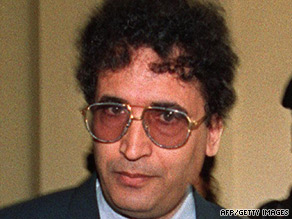
Pan Am Flight 103 was 31,000 feet in the air, heading for New York City, when it exploded over Scotland on the longest night of the year, December 21, 1988, killing 259 people on board and 11 people on the ground below.
It was the world’s deadliest act of air terrorism until the September 11, 2001, attacks on New York and Washington, according to the FBI. American and British investigators painstakingly pieced together the aircraft’s wreckage and found it had been destroyed by a bomb, which they accused Abdelbaset Ali Mohmed al-Megrahi and another man of planting. Al-Megrahi, once the security chief for Libyan Arab Airlines, and Al-Amin Khalifa Fahima were Libyan intelligence agents, the U.S. and Britain alleged in a November 1991 indictment on 270 counts of murder and conspiracy to murder. The indictment set off a battle that lasted more than seven years. Libya at first refused to hand the men over, prompting the U.N. Security Council in April 1992 to slap sanctions on the north African country, clamping down on arms sales and air travel. The Federal Bureau of Investigation put the men on its 10 Most Wanted Fugitives list — the only time officers of a foreign government have ever been named on the list, as far as the FBI knows, spokesman Ken Hoffman said.
Don’t Miss
Scottish government yet to decide on bomber’s release
Two years later, Libya floated the idea of trying the men in a neutral site, in an international court, which the United States and Britain rejected. In the summer of 1998, they made a counterproposal: that the men face justice in the Netherlands under Scottish law. By the end of the year, matters came to a head: Kofi Annan, then the secretary-general of the United Nations, met Libyan leader Moammar Gadhafi in Tripoli, Libya. Ten days later, a U.S. Appeals Court ruled that the families of the 189 Americans killed in the attack could sue Libya for its possible role in sponsoring the attack. Libya agreed the next day to let the men face trial. They were handed over on April 5, 1999, to the United Nations, which suspended its sanctions the same day. The move triggered a slow thaw in relations between the United States and Libya. Two months after the handover, American and Libyan officials met face-to-face for the first time in 18 years. Al-Megrahi and Fahima made their first court appearances before the end of the year. The trial lasted nine months. Al-Megrahi was convicted of the murders after prosecutors dropped lesser charges and was sentenced to at least 27 years in jail. Scotland does not have the death penalty. Fahima was found not guilty. Al-Megrahi has always insisted he is innocent and filed one appeal after another against his conviction. His first one was rejected in 2002. While al-Megrahi continued to fight his sentence, the United States and Libya continued talking. Libya agreed in 2003 to pay $2.7 billion in compensation to the families of the bombing victims, though Gadhafi always remained cagey about admitting official Libyan involvement in the bombing. The flamboyant Libyan leader also formally renounced the pursuit of weapons of mass destruction at the end of 2003, opening the country up to nuclear inspectors after months of secret negotiations with the United States and Britain. The United States restored full diplomatic ties with Libya in 2004, after 24 years. In June 2007, the Scottish Criminal Cases Review Commission cleared the way for a fresh appeal by al-Megrahi, ruling that it had uncovered new evidence and that al-Megrahi “may have suffered a miscarriage of justice.” Before the appeal could be heard, however, it emerged that al-Megrahi had terminal cancer. The appeal went ahead in April 2009, leaving al-Megrahi awaiting at least two different decisions about his fate: Will he be cleared on appeal Will the Scottish justice minister free him on compassionate grounds because of his cancer And, of course, a third question also looms: Will he live long enough to find out